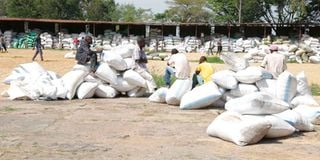Premium
Ahero rice farmers say produce going to waste for lack of buyers

Bags of rice stored at the National Irrigation Authority’s drying field in Ahero, Kisumu. 2021. Farmers have decried the lack of a ready market for their produce.
In the past three months, Mr George Oduor, a rice farmer in Kisumu, has harvested about 360 bags of the produce from his eight-acre farm.
Despite the bumper harvest, Mr Oduor is stuck with his rice at the Ahero Irrigation Scheme stores.
He has no market for the rice. The only option would be to sell his produce to Ugandan traders at a throwaway price of Sh30 a kilo.
Mr Oduor is among hundreds of farmers in Ahero, Kisumu County, who are contemplating abandoning rice farming.
“We had a market through Kenya National Trading Corporation (KNTC). The deal was to buy the rice paddy at Sh45 per kilo, but they are no longer taking any rice from farmers,” said Mr Oduor.
Rodents and pests
At the Ahero drying yard, more than 20,000 bags of rice are going to waste, with rodents and pests having a field day.
Some of the bags are torn, leaving the rice exposed to moisture. Already, some of the rice has started germinating.
Mr Oduor told the Nation that last year, he took a Sh160,000 loan from AFC Bank for rice production.
“We are worried. I might not plant this year. I have to make sure I sell off this produce before I can venture into production once more,” he said.
Another farmer, Mr George Owuor, has about 160 bags wasting away at the Ahero stores. He is running out of patience for lack of a ready market for his rice.
“It is very sad that the government allocated Sh660 million in 2020 to buy local rice, but to date, we are yet to benefit from that funding,” lamented Mr Owuor.
Sold to Uganda
He is now appealing to the government to intervene and get markets for their produce.
“It is very unfortunate that the locally grown rice meant to boost food security in Kisumu, finds its way to Uganda,” said the farmer.
However, KNTC argues that the Covid-19 pandemic messed up the sale of the rice. With most of the learning institutions closed for the better part of 2020, the parastatal lacked a ready market to sell the milled rice.
KNTC Director Pamela Mutua said the institution was working on reducing the stock levels to create space for repeat purchase from rice farmers.
Waiting for funds
She said the parastatal is working on processing the April and May orders for all regions when cash flow allows.
“We have to date procured rice from Nyanza to the tune of Sh186,899,864 — an estimated 34,128 bags (50kgs). Specifically, to Ahero, we have disbursed a payment of Sh29,255,250 to date,” said Ms Mutua.
She added, “We shall endeavour to ensure we take up what we can.”
She noted that production in most areas has almost tripled.
Loans
Ahero scheme’s irrigation officer Issack Munga noted that some of the farmers have defaulted in repaying their loans.
“Some of the farmers have failed to service their loans, not because they failed to produce, but due to the market issues. The interest for the loans is increasing with time,” said Mr Munga.
The Ahero Irrigation Scheme management is now worried that marketing challenges will cause a spiral effect on the activities of the scheme.
“We started the planting season in May. We expect to cover 2,000 acres of land. But with the current marketing challenges, we have managed to get only 200 acres for the next planting season,” said the irrigation officer.





